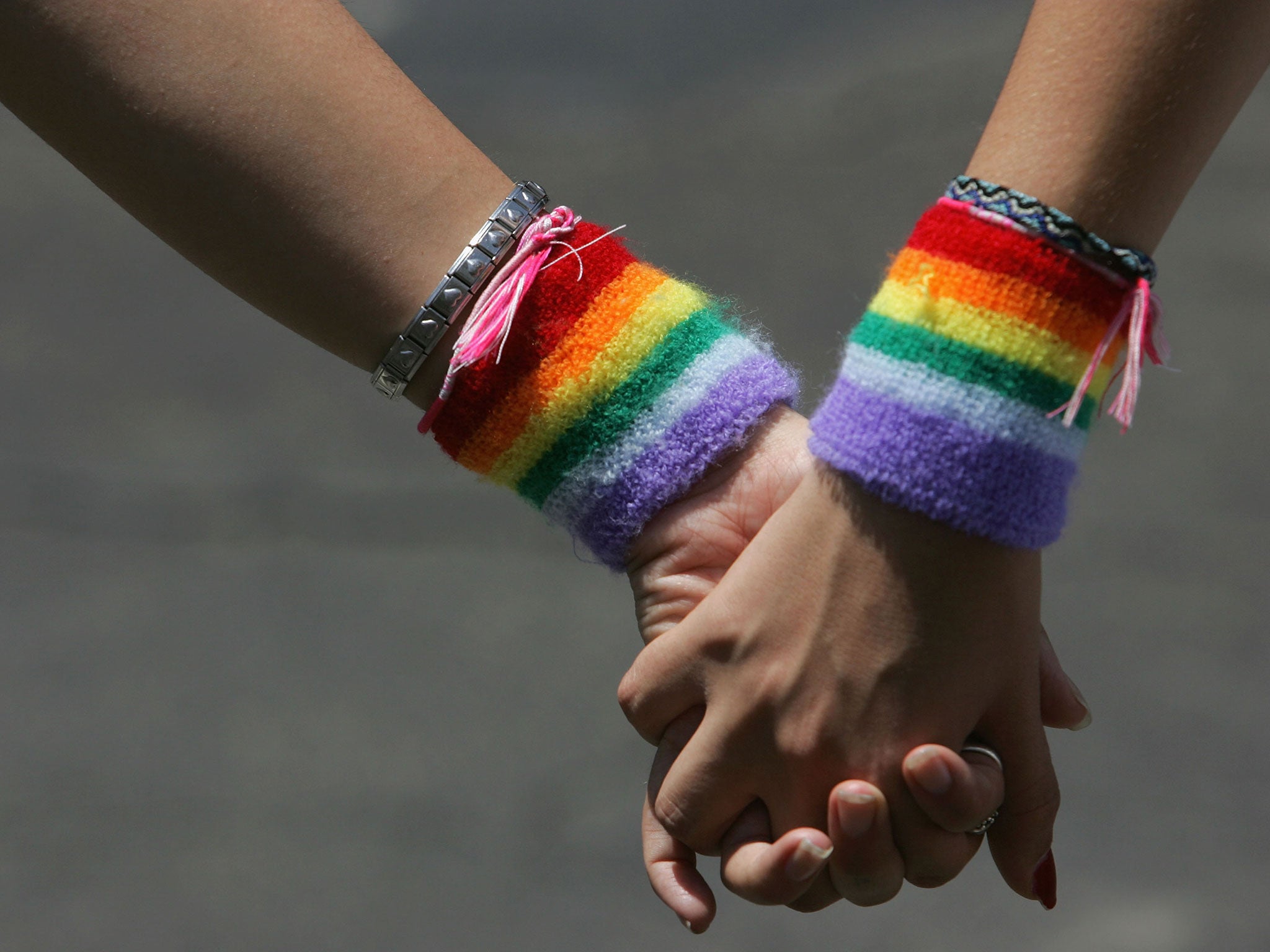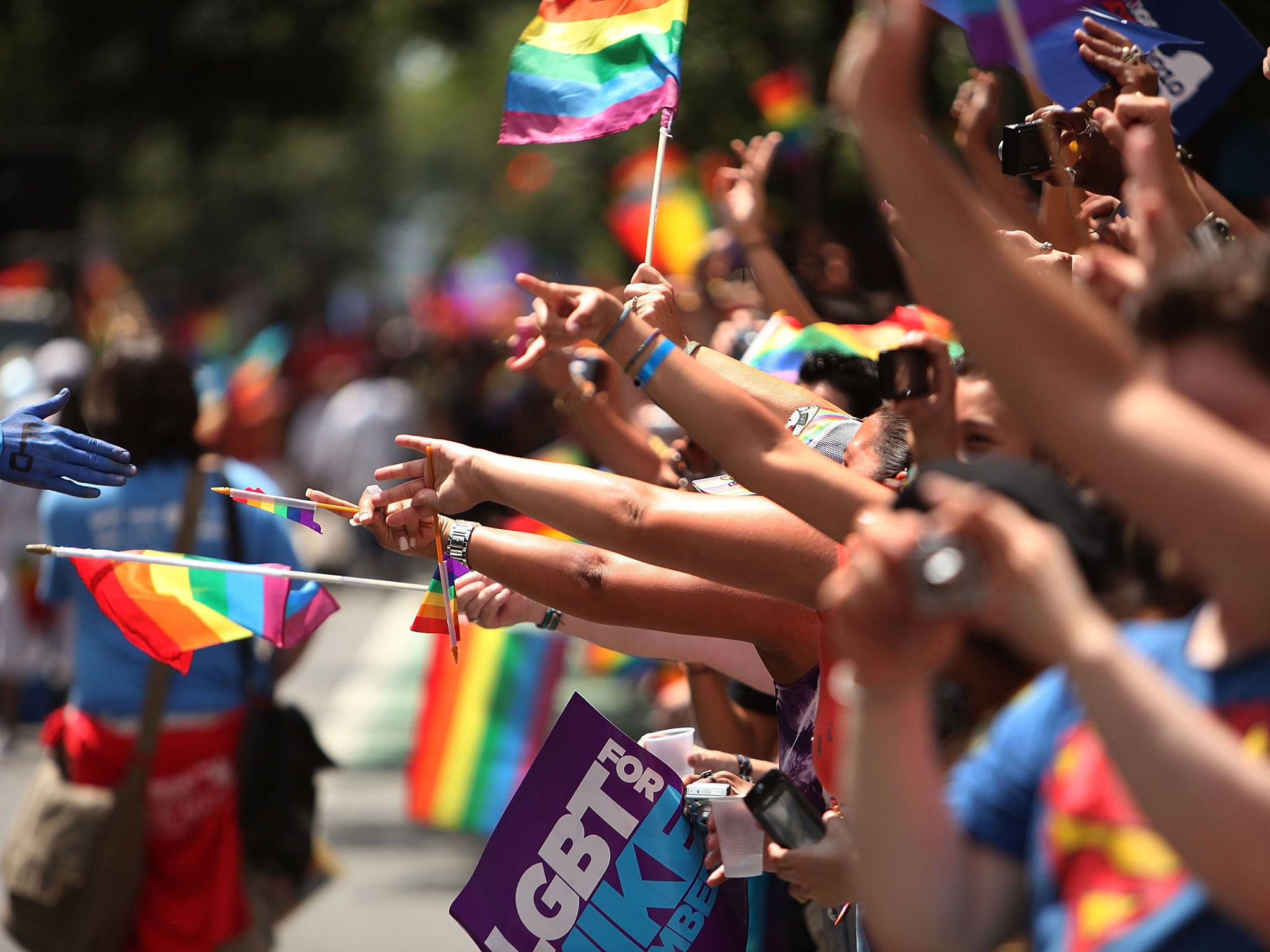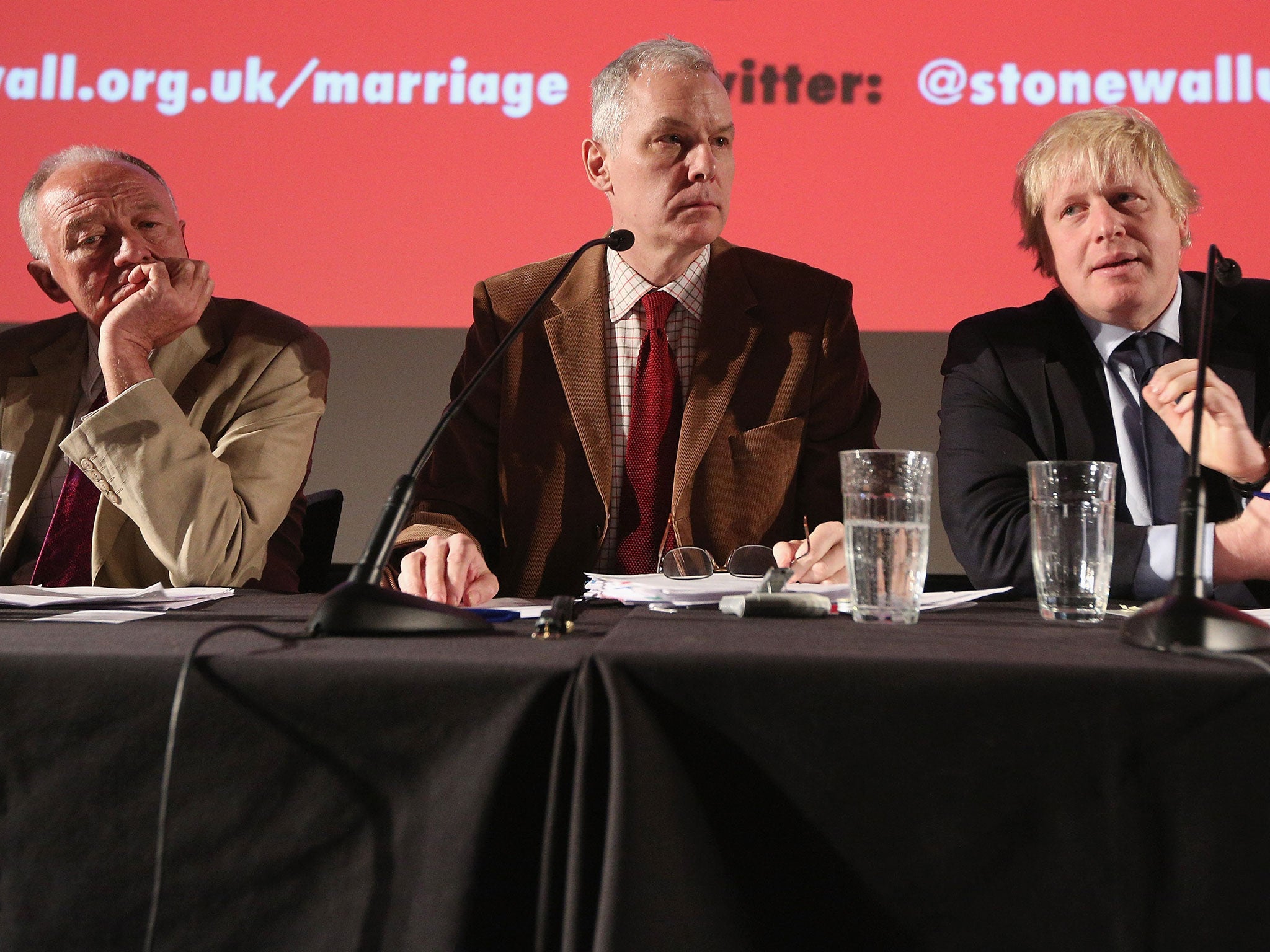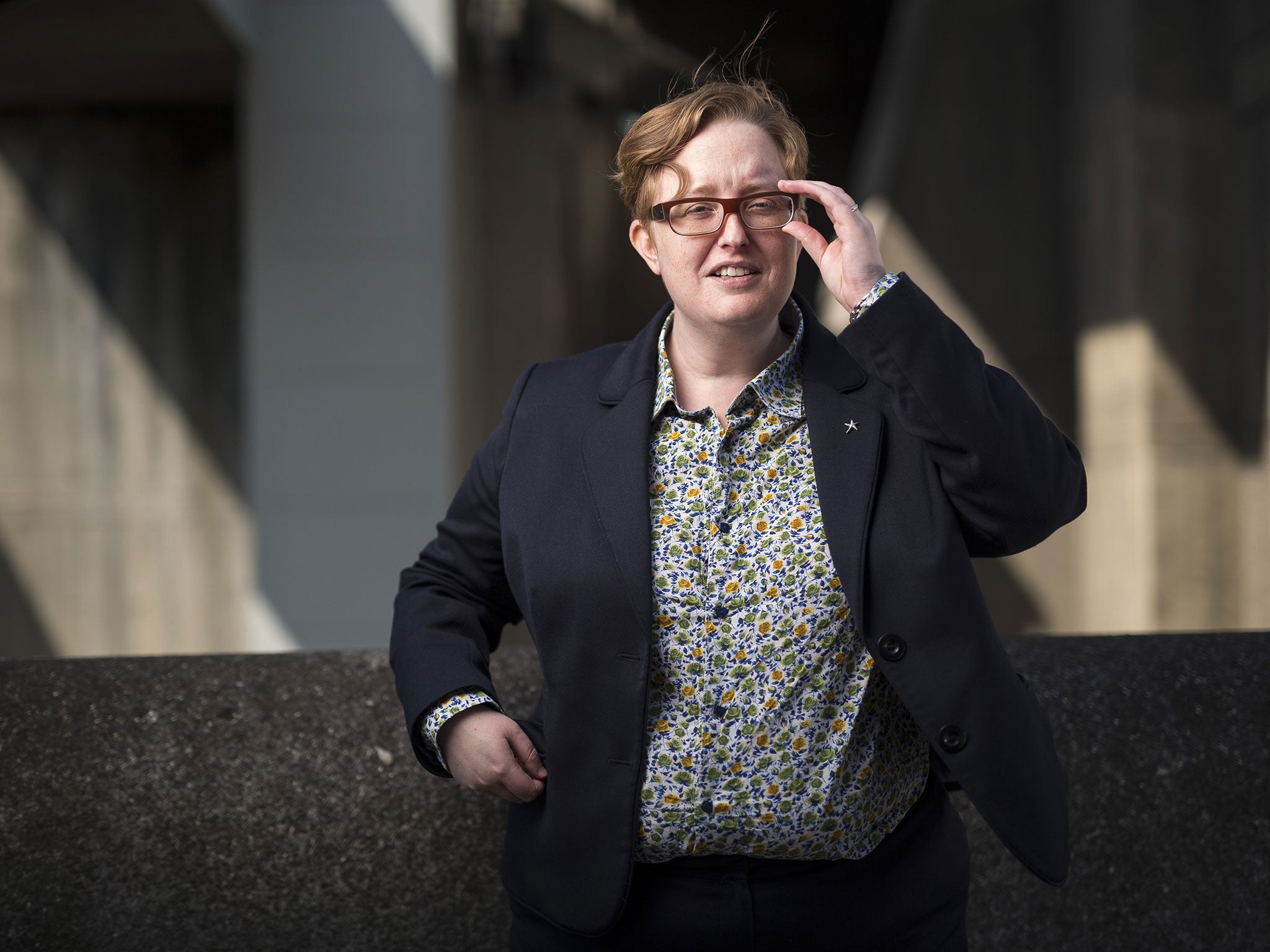Ruth Hunt interview: 'People say it's fine now – it's not. We still edit ourselves'
Stonewall’s new chief executive says most of the major legislative battles for LGBT rights have been won, but homophobia is still widespread

If Ruth Hunt needs a reminder that homophobia is still rampant in Britain she doesn’t need to look very far. Hunt, 34, who was announced this week as the new chief executive of the lesbian, gay and bisexual charity Stonewall, lives with her civil partner Kirsty in a flat in East London. They have lived in the same building for five years but she says some in the neighbourhood wish they didn’t.
“They give us homophobic abuse all the time,” she says. “They complain about everything we do and underneath all that is that we’re ‘fucked up dykes’. That’s what they call us, they say ‘you’re fucked up dykes’.”
She has reported the abuse to the police who are apparently confused about what to do.
Strangers in the street aren’t much better. “Me and Kirsty went away this weekend and we had to be really careful. This boy came up to me and went, ‘are you a boy or a girl?’ I was like ‘look, I’m in a crap t-shirt and a pair of shorts, does it really matter?’ and he said ‘well I just really can’t tell. And are you two sleeping together or what?’
“This bollocks that ‘oh, it’s amazing now and gay people are great because they can get married and get full rights at work’. No, because in our streets and our communities, you know, if I walk through Forest Gate in a suit I get far more shit. And gay people just kind of get used to it.”
The constant expectation of abuse – and the way it makes people self-police how public they are about their sexuality – is still a massive problem, she says.
“Me and Kirsty, as soon as we get into Zone Three (on the Underground), we won’t hold hands any more. That’s so instinctive it doesn’t even get thought about any more, so you will see gay couples assessing a situation meticulously and behaving differently based on the safety of the environment. Which is why when people say it’s fine now – it’s not, because we’re all still editing ourselves.”
This “editing” has been familiar to Hunt from a young age. Growing up in a Catholic family in Cardiff, she kept her sexuality from her parents for several years.

Eventually she was rumbled when the lesbian magazine Diva called her landline. She was 15 or 16 and had been secretly writing columns for them about what it was like to be young and gay.
The magazine assumed she had already come out to her parents, so when her mum answered the phone they said where they were calling from and asked to speak to her daughter.
Hunt recalls: “My mum asked, ‘what’s Diva?’ and I said, ‘oh it’s just some feminist magazine, mum’, but she went to the library and looked it all up. It was awful. On reflection I think there were probably better ways for her to find out. She was very, very concerned about me and thought I was too young to make such a decision and that I would ruin my life and career.
“My dad just said ‘I love you Ruthie, it’s alright, but you know what your mum’s like’. She sat me down and we talked about it. She said ‘it would be fine if you were gay but you’re not, you just think you are’.”
She says her mother is “alright now” about her sexuality but that it took “about a decade”. The clearest sign of progress came in 2010 when she attended Hunt’s civil partnership to Kirsty, a dancer-turned pathologist who has been her partner for the last decade.
Though coming out initially pushed Hunt apart from family, she has kept to their religious roots. The first practicing Catholic to run Stonewall, she attends a church in the city twice a month and is a godparent to several children.
“Church was a real unifying space and as I grew up and grew older I didn’t want to reject that just because church leaders reject me, when I’ve never really had any problem with congregations,” she says.

Once in church the “editing” continues though. She does not want to be public about her sexuality there because, she says, “I just want somewhere where I can just be.”
“They wouldn’t know anything about me to be honest. I go there and I pray and it’s my space. I don’t go in and say ‘I’m an active homosexual, please can I choose the hymn’ but nor do I go in and say ‘this is what I did at work’. It’s my space and time.”
One of the things she hopes to do in her new role is break down the barriers between gay people and the church. “There’s a real need for Stonewall to build a common ground and demolish that sense of ‘them and us’, she says. “There’s a real sense of The Gays vs The Church and it’s just artificial, it’s not how any of us work.
“I think the spiritual needs of lesbian, gay and bisexual people are completely overlooked…it’s heartbreaking for your family who have to see you be excluded from it. We hear a lot from gay couples now who are really upset they can’t have their wedding in their church.”
Hunt believes gay weddings will not happen in Catholic churches in her lifetime –though she is hopeful it might in the Church of Wales. But even if a religious ceremony were possible, she would not take it up since her partner Kirsty is an atheist.
Despite her mother’s dire predictions, Hunt’s career and life were far from ruined by coming out. After leaving school she went on to study at Oxford, where she was the first lesbian to be president of the Student Union.
From there, she threw herself straight into policy work for an equality charity and for the last nine years she has been at Stonewall, starting as a policy officer and working her way up.

She was the deputy to her predecessor Ben Summerskill, who led Stonewall for 11 years before stepping down at the start of the year. Under his tenure the organisation successfully campaigned to repeal section 28 and saw the introduction of civil partnerships and equal marriage.
His exit, though understood to be his own choice, followed a volatile internal row that the organisation remains vague about. All Hunt will say is, “Ben dedicated 11 years of his life to Stonewall and breaking up is hard to do.”
Summerskill had a reputation for being more bombastic and confrontational than Hunt, who says she wants to “change the tone” of what the charity does. A warm and quick-witted raconteur, she peppers her political points with personal anecdotes that give her arguments an emotional persuasiveness.
Her quiet approach can be anathema to the louder veterans of the gay rights campaign movement, but she believes that now the major legislative battles have been won, Stonewall will be most effective as a gentle but persuasive force to win over public opinion and stamp out homophobia.
Hunt is the second woman to lead the organisation – the first was Angela Mason, who successfully campaigned for adoption legislation that treated lesbian and gay couples in the same way as heterosexuals.
If Hunt goes on to become a household name in Britain, she will be joining a very short list of out lesbians in public life, a situation that she feels needs addressing urgently. “There is significant lack of visibility of lesbians,” she says. “Poor Sue Perkins and Clare Balding have to carry the flag on absolutely everything. And Stella Duffy and Susan Calman – these women who have to play these incredibly visible roles as role models all the time.

“We live in a patriarchal society and sometimes for women that can sometimes be enough of a barrier so they hide their sexuality more than men do. Stonewall works with 650 employers and gay men are much more likely to be out than lesbians in much higher numbers.
“And when we do events – if you ever came to a Stonewall event it would feel very male-dominated – but as soon as we do a women-only event it’s swamped. So women don’t want to hang out in that space in the same way.”
She says wryly: “We presume that gay men and lesbians make the best of friends and we don’t always really. So socialising with lots of gay men isn’t always as fun as socialising with lots of lesbians.”
As fun as that is, Hunt is clearly going to be doing more in the new job than socialising. Through friends’ children she has had her eyes opened to the creeping homophobia still present in schools and she is desperate to end it.
She explains: “There’s a child in my life who went back to her school after our wedding and did show and tell. She said, ‘we went to Ruthie and Kirsty’s wedding and there were fireworks and pirate outfits and then we went on a punt’ and the teacher freaked.
“She phoned up her mum and said ‘do you know that she’s talking about this stuff’ and her mum went ‘it’s fine, what are you talking about?’ So the reality is these kids are experiencing stuff. We need to help teachers chill out a bit and get their heads around this.”
The story is, she says, yet another example that, when it comes to battling homophobia, “we’re just not done yet”.
Join our commenting forum
Join thought-provoking conversations, follow other Independent readers and see their replies
0Comments